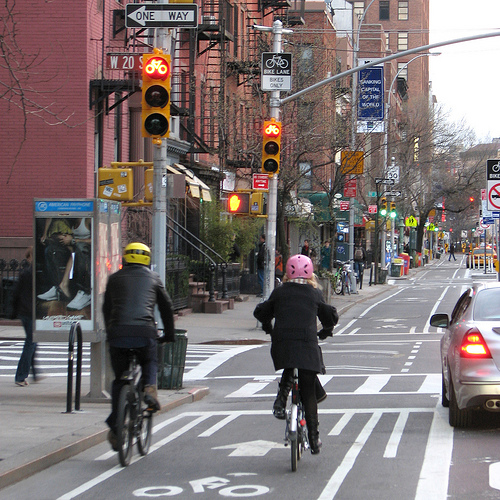 Photo: Kyle Gradinger“Share the Road” has one potential fatal flaw: It involves sharing, which a lot of purported adults haven’t really mastered. Matthew Shaer’s exhaustive history of the NYC bike lane struggle, in this week’s New York magazine, shows just how much people have to mature before a community — even Brooklyn — can become truly bike-friendly. Step one: Stop calling bike lanes “homegrown terrorism.”
Photo: Kyle Gradinger“Share the Road” has one potential fatal flaw: It involves sharing, which a lot of purported adults haven’t really mastered. Matthew Shaer’s exhaustive history of the NYC bike lane struggle, in this week’s New York magazine, shows just how much people have to mature before a community — even Brooklyn — can become truly bike-friendly. Step one: Stop calling bike lanes “homegrown terrorism.”
Basically, the pro side says that bike lanes have increased the number of people who bike to work, decreased bike accidents, and calmed down traffic. The con side says that safer streets are slower streets, lane usage and safety numbers are lies, bikers are dangerous jerks sometimes and holier-than-thou always, and… well, this:
“The anarchy that has been allowed to prevail is astonishing. According to butterfly theory, according to chaos theory, I am sure that the level of emotional and psychological damage wrought by the bicycle far exceeds the damage done by cars.” And then [reformed bike shop owner Jack] Brown goes there: “It is homegrown terrorism. The cumulative effect is equivalent to what happened on 9/11.”
The rhetoric is high on both sides — or at least it’s perceived that way. “[The cyclists] think that we’re a bunch of old, crotchety rich people that don’t understand that they deserve to have a bike lane on our street,” says an anti-bike lane activist. And according to Shaer in New York, views of the anti-lane Post can be summed up thus: “[T]he bike-lane rollout [is] an invasion of socialist-leaning, Eurocentric, limp-wristed Lycra warriors.”
Some of this criticism is well-founded: The part about bikers sometimes behaving like dicks on wheels is no exaggeration. (Still, are they any worse than people in cars?) But the terrorism thing is … a little over the top. (Another opponent describes bike lanes as “monstrous.”)
In fact, bike lane haters seem to lean heavily on ad hominem in general, dismissing the actual data — bike lanes in NYC have led to a 16 percent reduction in bike accidents and increased the number of bike commuters — as lies and fudging.
Shaer sums up the problem:
The [Department of Transportation] can put in bike lanes by the thousands, but the more important transformation will be internal: We are going to have to learn to accept a decrease, however minuscule, in our individual freedoms. For bike lanes to really work, New Yorkers are going to have to learn to share.
With all the buttwad behavior on display, what are the chances? New York’s “Don’t Be a Jerk” bike etiquette campaign might help — but only if both sides take it to heart.



